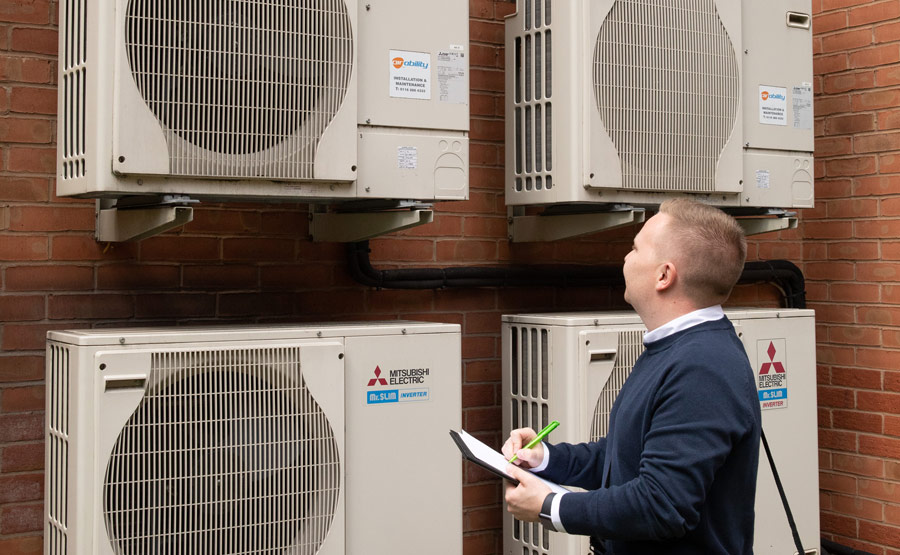Air Conditioning Inspection Reports Require Tougher Enforcement
All air conditioning systems in England and Wales with an effective rated output exceeding 12 kW are required to undergo regular inspections by an accredited energy assessor. The assessor must produce an Air Conditioning Inspection Report (ACIR). The government has recently proposed measures to enhance the quality of these reports, along with plans to strengthen compliance. Elmhurst has reviewed these proposals and offers an overview of the direction we believe the reforms for these energy certificates should take.
Tougher enforcement needed
Elmhurst supports the government’s proposal to raise the fine for non-compliance, increasing it from £300 to £800. However, we believe that simply increasing the fine will not be sufficient to address the underlying issue of low compliance.
One of the primary reasons Elmhurst believes compliance remains low is that system owners are not being fined frequently enough, or in many cases, not at all, rather than the fines being too low. Increasing the fine amount will only have a meaningful impact if accompanied by more rigorous enforcement measures to ensure that fines are issued consistently when non-compliance is identified.
As an accreditation scheme, it would be beneficial and encouraging to have sight of data detailing the number of fines issued for ACIR non-compliance, as well as for other energy certificates. Greater transparency on enforcement activities would provide valuable insights into the effectiveness of current compliance measures and help identify areas where enforcement could be improved. Without this data, there is a risk that increasing fines alone may fail to achieve the desired outcome of improving compliance rates.

Redesign the ACIR and make cost key
Elmhurst strongly agrees with the proposal to redesign the structure of ACIRs. The current report can be overly complex, and occasionally repetitive, which can discourage system operators from fully engaging with the recommendations provided. Simplifying the format and making the reports more user-friendly is likely to encourage system operators to take meaningful actions to improve the energy performance of their systems.
We also support the proposed redesign information outlined in the consultation. In particular, Elmhurst agrees that including a cost metric within the ACIR would be highly beneficial. Providing an estimate of the likely overall cost of improvements alongside the potential savings from implementing those recommendations would increase the relevance of the report to system operators. This approach would make the ACIR more actionable and help drive greater engagement with energy performance improvements. A proposed redesigned ACIR would show the following information:
- the likely efficiency of the system and any suggestions for improvement of any faults identified during the inspection and suggested actions
- the adequacy of equipment maintenance and any suggestions for improvement
- the adequacy of the installed controls and control settings and any suggestions for improvement
- the current size of the installed system in relation to the cooling load and any suggestions for improvement
- consideration of the capabilities of the system to optimise its performance under typical operating conditions
- a summary of the findings and key recommendations
Combine the total rated output with current electricity prices
The most suitable data for calculating potential cost savings from air conditioning system improvements would involve combining the total rated output of the air conditioning system with current electricity prices. This approach would allow for more accurate estimates of both energy consumption and the financial impact of recommended improvements.
Data on system output could be obtained through various means, including:
- Information provided by the current building owner or manager, who should have records of the system’s specifications.
- Data collected during the production of commercial Energy Performance Certificates (EPCs), which often include details on the building’s mechanical systems.
- Benchmarking against similar buildings, particularly for cases where direct data is unavailable.
Data quality and availability are likely to vary depending on the building and the records kept by its management. Therefore, providing a flexible approach that accommodates both direct system data and benchmark estimates would ensure the widest applicability of the cost-saving calculations. Ensuring that data sources are reliable and clearly referenced within the ACIR would further enhance the quality and credibility of the report.
Include data on fuel prices
Moreover, data on fuel prices could be incorporated into the ACIR by either:
- Allowing current prices to be input directly by the system operator, ensuring the calculations reflect real-time market conditions.
- Using standardised prices, similar to the approach used in RdSAP assessments, which would provide consistency across reports but may be less reflective of local variations in energy costs.
Elmhurst’s view is that a default model should be able to be created using standard prices but there should also be an option for Actual known electricity prices to be entered. (providing this could be suitably evidenced)
Finally, to enhance the quality and credibility of the ACIR, it is essential that all data sources are clearly referenced within the report. This transparency would ensure that building owners and operators have confidence in the cost metric provided and can make informed decisions about implementing energy and cost saving measures.
Elmhurst encourages its members, and anyone involved in the industry to read and respond to the government consultation in advance of the deadline on the 26th February. Elmhurst will be sharing its full draft response with members in the coming weeks.
Related Links
To read the government consultation, please click the following link: https://www.gov.uk/government/consultations/reforms-to-the-energy-performance-of-buildings-regime/reforms-to-the-energy-performance-of-buildings-regime
